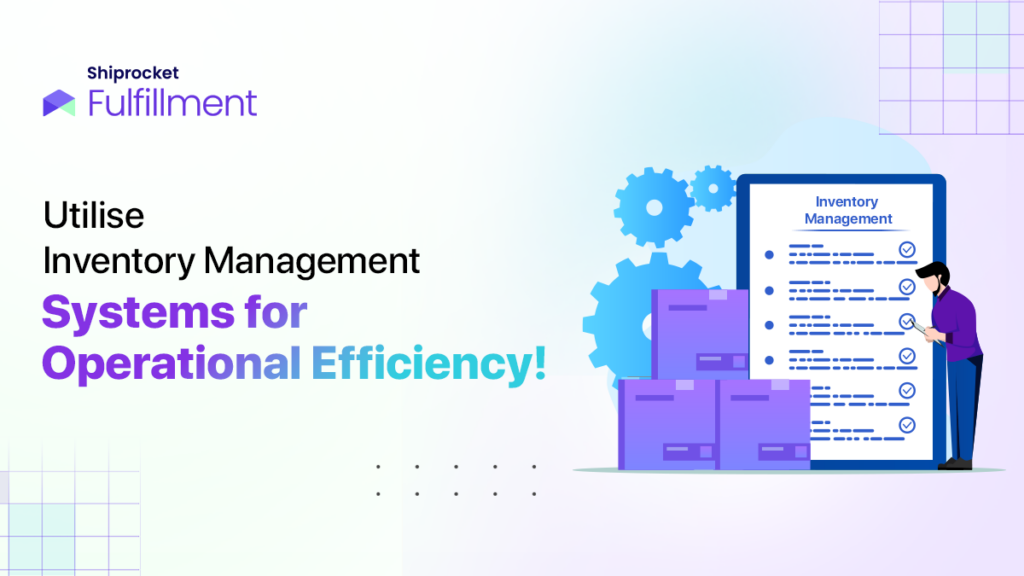A firm must employ inventory management to sustain a profitable and productive business. All sorts of production units, storage facilities, and retail centers rely on proper inventory management to maintain production and fulfill customer orders. Manually tracking Inventory can be tedious and erroneous, while electronic inventory management systems offer many advantages. Human mistake is the main problem in 46% of warehouses nowadays. So, 67% of warehouses are planning to use mobile devices to expedite inventory management.

Inventory Management Software: An Explanation
Inventory management refers to keeping track of all your stock while utilising, ordering, stocking, and storing it. Every business follows some method to record its Inventory and manage operations. These may include tracking finished goods ready for sale or the equipment and supplies used to produce goods or render a service.
The purpose of inventory management is to provide frequent updates to manage the flow of materials efficiently, optimally use people and equipment, harmonise internal operations, and intercommunicate with customers. The system helps managers make informed decisions about inventory by providing accurate information and timely updates.
Many businesses prefer inventory management systems or software to handle the outflow and inflow of stock quickly and efficiently, along with inventory audits, inventory control, and purchase order management. Automating inventory procedures with the use of inventory management software also helps them run more profitably. It may enhance customer satisfaction, operational effectiveness, and overall profitability regardless of the industry in which it operates.
Maintaining the Inventory helps companies deal with fluctuations in demand and manage lead time.
What is the purpose of Inventory Management Systems?
You might assume that maintaining accuracy in inventory management is easy, but various factors often complicate this process. Inventories are frequently spread across multiple channels in a supply chain, like stores, distribution centers, and more. Rapid fluctuations may pose additional challenges, as observed in eCommerce platforms handling a diverse range of products and coping with frequent transactions.
To effectively manage Inventory, it’s crucial to have visibility on factors such as when, how much, and where to store stock. Therefore, having an inventory management system becomes essential to ensure timely order fulfillment, decrease shipment turnaround times, and avoid situations such as stockouts and oversells.
Advantages Businesses Can Leverage by Using Inventory Management Software
There are several advantages of incorporating inventory management software. Some of the essential ones are as follows:
Accurate Inventory Records
Inventory management systems (IMS) help fulfill customer orders and track products across various production, storage, and sales stages. Many of these systems also function as point-of-sale tools, capable of processing payments and integrating with existing systems. When a firm maintains precise inventory records, it reduces internal management costs and breeds more potent relationships with customers and partners.
Cost Minimisation
Businesses often end up stocking more goods than needed, which leads to paying additional costs. The purpose of inventory management systems is to help reduce these extra costs by preventing overstocking. These additional expenses include fees for storing surplus inventory over a prolonged period in a rented warehouse, wages associated with excess stock management, insurance expenses for rented or leased warehouses, and increased transportation costs for moving surplus Inventory.
Greater Customer Satisfaction
Companies can fulfill customer orders quickly and efficiently with an accurate inventory management system, enhancing the customer experience. Happy customers equate with repeat orders and customer loyalty. It strengthens the relationships with customers and creates a fonder brand image.
Improved Production Processes
Introducing effective Inventory Management Software reduces the number of errors in the production process. With an improvised production rate, firms can provide higher-quality products at a faster pace. Moreover, the purpose of an inventory management system is to reduce the burden on the company’s labour and staff. It allows them to impart more time to other areas as well, which increases the overall efficiency of the business.
Automation of Processes
Another advantage of this software is having the inventory management processes automated. The purpose of inventory management also includes automating the process to downsize labour costs, minimise errors and provide more accurate stock tallies. It eliminates the need for manual counts, reducing the risk of fraudulent behaviour and human errors.
Enhanced data security
Data breaches and cybersecurity threats are highly likely to occur when maintaining inventory records. The inventory management system provides multiple layers of data security by providing users with restricted access to the company’s inventory. Such permissions help prevent the potential costs of data breaches and ensure that internal operations remain private. It safeguards companies against cyberattacks and streamlines error troubleshooting.
Better Organisation and Systematic Approach
Inventory management systems also help facilitate better organisational structures. It enables the employees to categorise products based on size, shape, name, or other relevant parameters. Systematically organising the stock further allows the business to streamline order fulfillment while accurately fulfilling orders and tracking products.
Efficient Coordination Across Locations
An advantage of inventory management systems involves promoting organisation and coordination between different facilities for businesses with multiple warehouses or retail locations. The improved coordination helps reduce costs, enhance sales, elevate the brand’s image, and attract new customers.
Improvised data visibility
An IMS effectively increases data visibility for a company’s executive team. The heightened visibility enables responsible managers to make more informed business decisions. It leads to fewer errors, such as identifying discrepancies in inventory counts.
Attributes of a Good Inventory Management Software
A good Inventory Management software (IMS) comes with many features, but some apps may not have the crucial attributes. Therefore, it’s necessary to choose an efficient IMS software for your business. Here’s a list of features you must look for in an IMS software:
Inventory Control:
This feature of IMS helps you keep track of every piece of inventory. It manages and updates details such as inventory level, product history, and other product specifications. The purpose of a good inventory management app is to sync all the accumulated data to other modules in the inventory system. It helps team members in various locations collaborate and maintain accurate records.
Barcoding and Tagging:
The barcoding and tagging feature in IMS is good for eliminating human errors. These mistakes occur if businesses manually manage inventory. You can scan barcodes to enter the data instead of doing the tedious manual work. It’s a more reliable way of making the data entries and reduces employee training time. A dedicated IMS app has this feature to enhance inventory control and precisely track pricing and product details.
Real-time Inventory Tracking:
The inventory tracking feature eliminates the need for warehouse employees to overlook the stock at every step. A good IMS allows businesses to instantaneously monitor stock levels, order statuses, and movements. It helps you make timely and informed decisions.
Reporting and Analytics:
A reliable and efficient IMS must cater to a business’s need for comprehensive reporting and analytics tools. These provide valuable insights into inventory performance, supplier relationships, and overall business trends. Most of the IMS can integrate different reporting tools and features, generating reports quickly. These customisable reports provide decision-makers with the information needed to optimise operations.
Demand Forecasting and Planning:
One of the most essential functions of IMS is forecasting demand. Businesses need to know which products need replenishment and which are plenty. This knowledge helps you serve your customers better and stay ahead of the market. It lets you use your resources judiciously and determine adequate purchase quantity, avoiding added costs or losses.
Inventory Notifications and Alerts:
Receiving timely notifications and updates about when your stock is low, or the live status of inflow and outflow of goods always comes in handy for businesses. The purpose of a potent inventory management software is to alert you about the inventory status so you can easily manage discrepancies on the spot.
Security and Backup:
It’s vital to have robust security features in an inventory management app. They protect sensitive inventory and business data from cyberattacks and frauds. This essential feature includes user access controls, data encryption, and security measures against unauthorised access or cyber threats.
IoT Integration in IMS:
The Iot integration feature in IMS is wildly popular these days. When you integrate Iot into your inventory management, you gain real-time insights into the location, status, and movement of goods, among other benefits. It helps manufacturers overcome manual challenges, with RFID playing a pivotal role. It offers real-time visibility and automatic recording of inventory details, allowing for more competent inventory management.
Cloud-Based Software with Instant Updates:
You can use the inventory app on any device with a cloud-based inventory system. It gives you the power to track inventory in real-time from any device, anywhere, at any hour. It enhances coordination among staff and facilitates quick and informed decision-making.
Integration of IMS App with Different Systems:
If your company has other software, integration with those business systems, such as accounting, order processing, and customer relationship management (CRM), is crucial. A good IMS has this integration feature that ensures a cohesive workflow and prevents data silos.
Enhanced Abilities in Transfer Management:
As your inventory-related business expands, handling recurring and complex inventory transfer requests becomes more challenging but crucial. It’s vital to successfully manage these requests to ensure warehouses remain well-stocked and business operations flow smoothly through transitions.
Mobile Accessibility:
Mobile accessibility is increasingly important in today’s dynamic business environment. A sound inventory management system should offer mobile compatibility. It allows users to access important information and perform tasks on the go.
Multi-location Support:
The software should support multi-location inventory management for businesses with multiple warehouses or retail locations. It ensures accurate tracking and control of stock across various sites.
Stock Returns Handling:
Handling stock returns is a crucial feature that every Inventory Management Software must include. In an eCommerce business, products are often purchased, delivered, and sometimes returned. It’s often challenging and overwhelming to manually handle returned items. The purpose of inventory management systems is to help you easily create, confirm, or cancel returns, assign them to the preferred warehouse, and set a pick-up date.
Additionally, it must include a return reason to decide whether the inventory should be refunded or replaced. It should also send return updates through SMS or email and synchronise tracking with the shipping partner.
Audit Trail:
This IMS feature is essential for tracking changes and activities within the system. It enhances accountability and helps identify the causes of discrepancies or errors in inventory data.
Shiprocket: Your Reliable Inventory Management Solution Provider!
If you’re a business looking for effective inventory management, Shiprocket is your ideal solution provider. They offer an inventory management system that helps you manage your stock efficiently by tracking your existing inventory systematically. It’s a single platform providing complete control over centralising your Inventory across channels.
With Shiprocket’s Inventory Management System, you can:
- Sync your inventory and manage sales across multiple channels
- Track and update your inventory effortlessly
- Keep your users informed and updated
- Automatically sync inventory for the finest shopping experience
- Manage your inventory on the go
- Get insightful inventory management reports
Learn about the additional features of Shiprocket’s Inventory Management System.
Conclusion
Today, companies face cut-throat competition in almost every aspect of business. One such crucial part is maintaining operational efficiency by optimising their supply chain. Implementing an effective IMS brings operational excellence and strategic growth by transforming how a firm handles its Inventory. Thus, understanding the purpose of Inventory Management Systems is paramount for businesses to cruise smoothly through the competitive land cape. The real-time tracking and streamlined order management with IMS help optimise stock levels, reduce costs, and enhance customer satisfaction, impacting efficiency across the supply chain. Businesses of all sizes must leverage innovative IMS solutions to avail benefits such as scalability for large enterprises and improved resource allocation for small businesses.
Yes, firms of all sizes can benefit from using IMS. It can help prevent overstocking, reduce holding costs, and improve order accuracy, allowing better financial management and growth for small businesses.
There are many potential challenges that a business might face without effective inventory management. They may experience stockouts, overstock situations, increased carrying costs, poor customer satisfaction, and operational inefficiencies.
A firm needs careful planning, training, and data migration to implement an Inventory Management System. Businesses should involve key stakeholders, conduct thorough system testing, and give training to employees to ensure a smooth transition.









